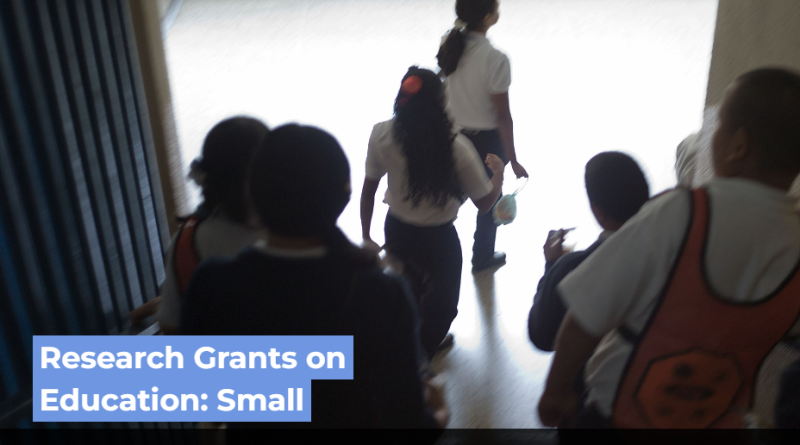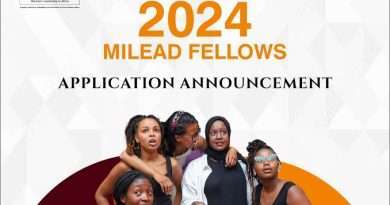Apply now for the Spencer Foundation Small Research Grants on Education Program
The Spencer Foundation Small Research Grants on Education Program provides support for education research projects that aim to enhance education in general, with budgets of up to $50,000 for projects lasting from one to five years. Eligible researchers can also request additional funds for a course release. Applications are accepted three times a year.
This program is “field-initiated,” meaning that proposals are not in response to a specific request for a particular research topic, discipline, design, or method. Our aim is to support rigorous, intellectually ambitious, and technically sound research that addresses the most pressing questions and compelling opportunities in education.
We aim to support scholarship that generates new foundational knowledge with a lasting impact on educational discourse. We acknowledge that learning takes place across the lifespan and in various settings—from the classroom to the workplace, family and community contexts, and even the playing field—all of which may, under the right circumstances, provide the basis for valuable study that contributes significantly to the field.
We value work that encourages creative and open-minded scholarship, engages in deep inquiry, and explores robust questions related to education. As a result, this program supports proposals from multiple disciplinary and methodological perspectives, both domestically and internationally, from scholars at different stages of their careers.
We expect proposals to cover a wide range of topics and disciplines that innovatively explore questions central to education, including education, anthropology, philosophy, psychology, sociology, law, economics, history, or neuroscience, among others.
Furthermore, we anticipate and embrace methodological variety in addressing important inquiries; therefore, we are receptive to initiatives that employ a broad range of research techniques such as quantitative, qualitative, mixed-methods, ethnographies, computational modeling, design-based research, participatory methods, and historical research, among others. We are amenable to initiatives that may integrate data from numerous and diverse origins, cover a substantial duration to attain a thorough comprehension, or collaborate closely with professionals or community members throughout the project’s duration.
Eligibility – Spencer Foundation Small Research Grants on Education Program
- Applications for the Small Research Grants on Education program should focus on research projects related to the field of education.
- Proposals for activities such as program evaluations, professional development, curriculum development, scholarships, capital projects, and software development will not be considered.
- Additionally, research studies in areas other than education will not be eligible.
- Principal Investigators (PIs) and Co-PIs must hold a doctorate in an academic discipline or professional field, or have relevant experience in an education research-related profession.
- While graduate students can be part of the research team, they cannot be named as the PI or Co-PI on the proposal.
- The PI must be affiliated with a non-profit organization or public/governmental institution willing to serve as the administering organization if the grant is awarded.
- The Spencer Foundation does not award grants directly to individuals.
- Eligible organizations include non-profit or public colleges, universities, school districts, research facilities, and other non-profit organizations with a 501(c)(3) determination from the IRS (or equivalent non-profit status if the organization is outside of the United States).
- Proposals are accepted from the U.S. and internationally, but all submissions must be in English and budgets must be proposed in U.S. Dollars.

Limitations
The total proposed budget for this program is restricted to $50,000 and should not include indirect cost charges as per Spencer’s policy. Eligible investigators are also able to request additional supplemental funds for a course release. Please refer to the Optional Supplemental Course Release section for further information.
Proposed projects must not exceed a duration of 5 years.
Principal Investigators (PIs) and Co-PIs are only permitted to hold one active research grant from the Spencer Foundation at any given time. This restriction does not apply to the administering organization; organizations are allowed to submit multiple proposals as long as they are for different projects and have different research teams.
PIs and Co-PIs are not allowed to submit more than one research proposal to the Spencer Foundation simultaneously. This restriction applies to the Small Grants Program, Large Grants Program, Racial Equity Research Grants Program, and Research-Practice Partnership Program. If the PI or any of the Co-PIs currently have a research proposal under consideration in any of these programs, they must wait until a final decision has been made on the pending proposal before submitting a new proposal.
How To Apply – Spencer Foundation Small Research Grants on Education Program
The process begins with submitting a full proposal; there is no need to submit an intent to apply form. The deadline for full proposals for a Small Research Grant on Education is 12:00pm Noon central time on the deadline date.
Full Proposal Guidelines
Small Grant proposals must be submitted through an online application form following the guidelines below.
Step 1 – Registration
Note: This application is configured for the Principal Investigator (PI) on the project to register and submit the form. If someone other than the PI will be completing the online application (e.g., an administrative assistant), the PI should register as described in Step 1 below, then provide their username and password to the person assisting them with the application.
If you (the PI) have never accessed the Spencer Foundation online portal, you must register and create a profile by going to https://spencer.smartsimple.us and clicking the “Register Here” button. Follow the guidelines on the registration page to create your profile.
If you already have an account, log on to update your profile and access the application.
Step 2 – My Profile
After logging in, follow the directions to complete the information requested on the My Profile page and upload your current CV (10-page limit). The My Profile page is your online account with the Spencer Foundation whether you are applying for a grant, reviewing a proposal, or submitting a grantee report.
Note: If you will have Co-PIs on your project, they must also register and complete their profile information if they wish to be included on the application.
Step 3 – Start a Proposal
To fill out the application, go to your Workbench and click the Apply button for the Small Research Grants on Education. Your draft application can be saved so that you can return to it at a later time and continue working on it. Once you save a draft application, you can find it again on your Draft Proposals list on your Workbench.
1. Small Grant Proposal Components
The online application provides detailed instructions for each part. Here is a summary of the components you will need to fill out.
Team Members – The person creating the initial application will automatically be designated as the Principal Investigator. If there are Co-PIs involved, they can be included in this section after completing Steps 1 and 2.
You will also need to confirm in this section that neither the PI nor the Co-PIs have any other research proposals currently under consideration at Spencer (refer to Restrictions).
Summary of Proposal – Details about the project are required, including the project title, duration, main research question(s), and a 200-word summary.
Budget and Justification – The budget form is categorized with a dropdown menu for each item listed in parentheses.
- Salaries (PI, Co-PI, Postdoctoral Research Assistant, Graduate Student, Researcher, Undergraduate Researcher, Other Research Staff, Other Staff, Supplemental PI Course Release, Supplemental Co-PI Course Release)
- Benefits (PI Benefits, Co-PI Benefits, Researcher Benefits, Other Staff Benefits, Tuition/Fees, Supplemental Course Release Benefits)
- Other Collaborator (Independent Consultant, Advisor)
- Travel (Project Travel, Conference or Dissemination Travel)
- Equipment and Software (Equipment, Software)
- Project Expenses (Supplies, Participant Stipends/Costs, Communication, Transcription)
- Other (This should only be used for expenses not covered in the choices above)
- Subcontracts (Information is pulled from the subcontract budget forms – see below)
Each expense for your project should be added and the budget narrative field should be completed, providing a description of that specific expense. Detailed guidelines are available within the application form.
Subcontracts: If your project will have subcontracts, a separate subcontract budget form will need to be completed for each. The subcontract form has the same categories and line-item choices listed above.
Proposal Narrative – You are expected to upload a proposal narrative pdf that includes the following:
A description of the project, the central research question(s), and the project’s significance.
A rationale for the project. This includes (a) summary of the relevant literature, the relationship of the proposed research to that literature, and the new knowledge or contribution to the improvement of education expected to result from the proposed research; and (b) a summary of the conceptual framework or theory guiding the project and how the project utilizes or builds on this framework of theory.
A description of the proposed research methods, description of participants, data collection instruments, and modes of analysis the project will employ. If applicable to the proposed methods, please include (a) information about the proposed sample/case definition and selection procedures; (b) research design, including when appropriate a description of the context of the study; (c) description of key constructs, measures and data sources; (d) procedures for data collection; and (e) procedures for data analysis.
This narrative may not exceed 1800 words and at the conclusion should include the word count in parentheses. Your reference list should follow your narrative in the same pdf file and will not count toward the 1800-word limit.
The text should be double–spaced and in 12-point font. APA style is preferred.
Note: Tables and other figures can be included in the text of your proposal, where appropriate, provided they are used sparingly. The text contained in any tables and figures will not count towards the word limit. However, it is important that you describe or explain any tables or figures in the narrative portion of your proposal, which will contribute to your word count. Do not assume that tables and other figures are self-explanatory.
Project Timeline– A project timeline should be uploaded as a PDF file and should indicate the proposed start and end dates of the project as well as key project events and milestones. The major activities listed in the project timeline should be reflected in the proposal narrative. The project timeline may not exceed 1 page and the text should be in 12-point font. The proposed project duration can be up to 5 years.
Project Team– A document describing the project team should be uploaded in pdf format and should identify the roles, responsibility and knowledge base of the PI, Co-PI(s), and any supporting researcher(s). In the case where your project includes Co-PIs and other supporting researchers, this document should articulate how the team will work together to complete the research project, highlighting what each team member will contribute to the project. Further, a short description of the relationship between the project team and the research site may be included, if appropriate. This document should not exceed 250 words and should be double–spaced in 12-point font. Note: this document will be reviewed along with the CV of the PI and any Co-PIs included on the application.
Optional Supplemental Course Release –The Spencer Foundation recognizes that scholars’ course loads vary significantly across the field creating differential contexts and capacities for research projects. To help mitigate these uneven demands on time, the PI or Co-PI may request supplemental course release funds of up to $10,000 over and above the $50,000 Small Grant budget limit, for a total of up to $60,000.
To be eligible, the scholar (PI or Co-PI) must have a course load of 6 or above per academic year. The supplemental funds cannot be used for anything besides a course release for the scholar and should be the standard rate for a course release at their institution. You may only request 1 additional course release per grant. Two things of note: 1) requesting the Supplemental Course Release funds does not guarantee they will be awarded, and 2) if you have a course load that is less than 6, you may still include a course release in your proposal budget, but your budget may not exceed the $50,000 Small Grants limit and you are not required to supply the documents requested below.
To apply for these the Optional Supplemental Course Release Funds, there are 3 additional application pieces needed:
- The amount requested and a brief budget narrative for the Supplemental Course Release should be included in the Proposal Budget section (detailed above). It should be clearly indicated in the Salary section of the budget form by choosing the appropriate Supplemental Course Release line item from the drop-down menu, as well as in the Benefits section as needed.
- A 250-word Course Release Rationale Statement describing how the additional course release will impact the proposed project should be uploaded as a PDF file.
- A Supporting Letter from the scholar’s Dean or Chair should be uploaded below as a PDF file. The supporting letter must include the following: (a) confirmation that the scholar’s course load is 6 courses or more per academic year, (b) confirmation that the scholar will be released from teaching a course, if awarded the supplemental funds, and (c) confirmation the budgeted amount for the course release is appropriate for their institution.
Optional Appendices A – If you have additional documents focused on scientific instrumentation relevant to the study, for example interview protocols or survey instruments, they can be uploaded in this section of the application as supplemental information.
Optional Appendices B – If you have other supporting documents, such as letters of agreement or collaboration, they can be uploaded in this section of the application. Please see the guidelines in the online application for more information about these types of appendices.
Optional Appendices C – Innovative Approaches to Equity in Research: We recognize that scholars and scholarship have continued to develop innovative approaches to conducting research in ethical and just ways. Scholars have raised that proposals attending to these issues in sophisticated ways often face choices in providing detail in their proposals. Thus, if you so choose, you are invited to upload a one-page appendix in your grant proposal to elaborate on the theoretical, methodological, and partnership structures, or other dimensions you deem as relevant to conducting ethical and just research. For example, if your work engages youth, families, or community-based organizations, you may want to elaborate on how traditional power dynamics will be addressed. Or, if your work engages with Indigenous communities, you may want to elaborate on the project leadership’s histories and engagement with Indigenous communities, any formal agreements (e.g. Tribal IRB or approvals), or the use of Indigenous methodologies in the project. Or, perhaps you are working on new quantitative measures or modeling approaches that would benefit from further explanation. We anticipate and welcome a wide range of other possibilities.
A note about IRB Approval: Proof of Institutional Review Board (IRB) approval is not required at the time of proposal submission. In the event that IRB approval is needed for this project and it is chosen for funding, the Administering Organization will be responsible for obtaining IRB review and approval in accordance with its institutional policies and applicable law.
Resubmission – If this is a resubmission of a proposal previously submitted to the Spencer Foundation, you are asked to indicate this within the application and upload a 1-page explanation of how the proposal was revised.
Project Data– Within the online application, we ask you to choose the appropriate options with regard to your research project in the following categories: disciplinary perspective, methodologies, topics, geographical scope, contexts, and participants. This information is helpful in determining the appropriate reviewers for your proposal and for internal evaluations of our grant programs.
Signature from Authorized Representative of the Administering Organization –This section of the application details the steps necessary to obtain the authorized signature for your proposal through the Adobe E-sign process. You are required to provide the Signatory’s name, title, and email address; this is normally an administrative or financial person that has the authority to sign the proposal on behalf of your organization. Note: The signature process must be completed by noon on the deadline date. You, as the applicant, are responsible for making sure your proposal is signed by the deadline. Please account for the time it takes your organization’s authorized signer to review and sign proposal submissions. We recommend filling in the online application at least a week ahead of the deadline date. The Spencer Foundation is unable to accept late submissions.
Submit
Once you’ve completed all of the elements listed above, click the Submit button at the bottom of the application page and it will be routed to your Signatory for signature and final submission.
Application – Spencer Foundation Small Research Grants on Education Program
- Full Proposal Deadline
September 11, 2024 (12 noon Central Time) - For details visit the application website
- To apply go to the application portal






